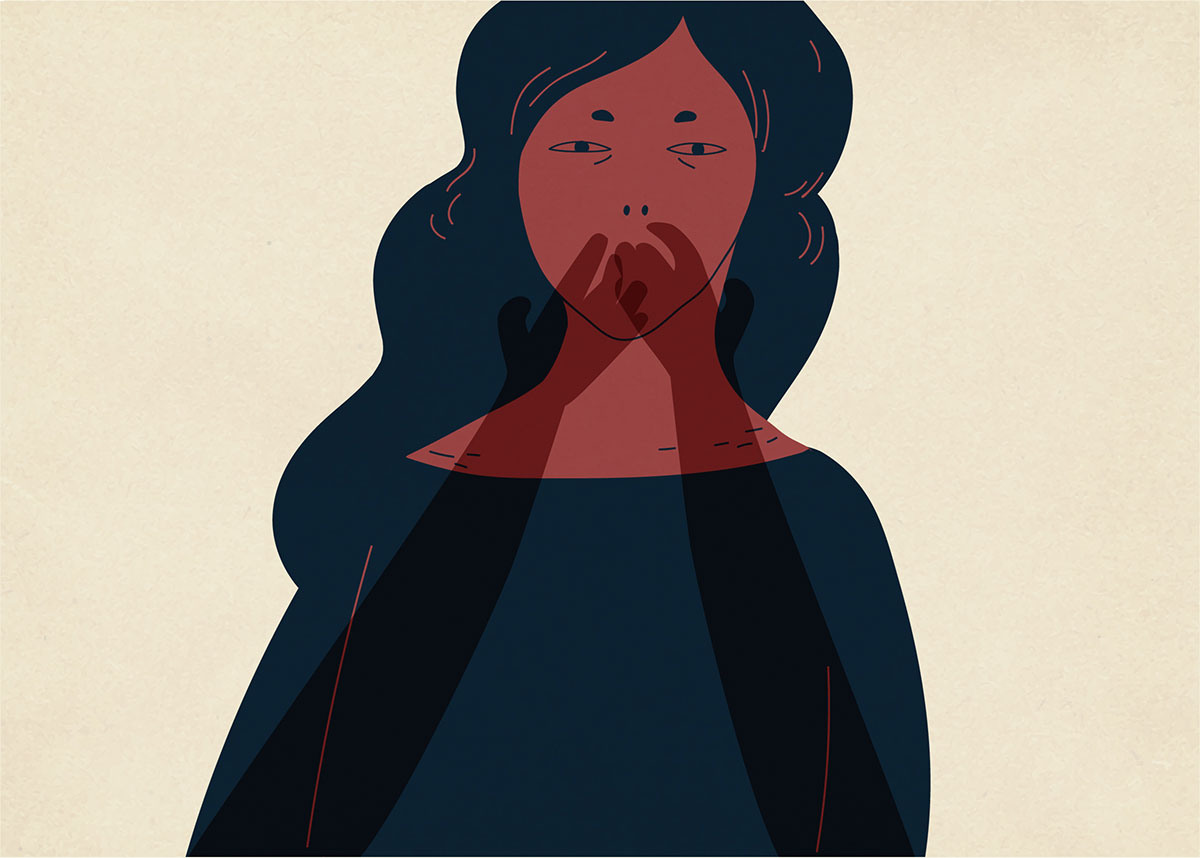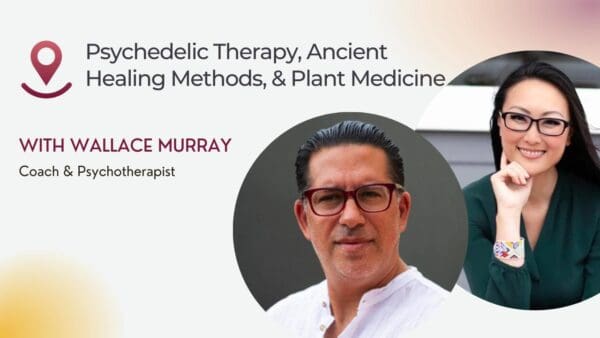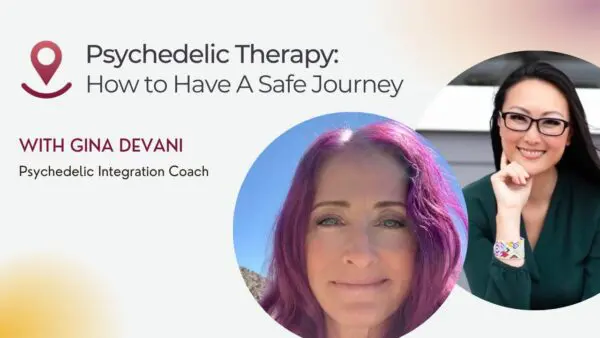Thank you to the dynamic array of people in psychedelic communities who are committed to ending sexual violence and who contributed to this article, including Katherine MacLean, Juliana Mulligan, Oriana Mayorga, Laura Mae Northrup, and Shea Prueger.
Sexual abuse is a difficult topic to address in a single article. The sociocultural, political and spiritual underpinnings are interrelated and complex.
This article will discuss sexual abuse in psychedelic ceremony contexts and what the community might do to better understand and prevent it. The article also includes some suggestions for how to address cases of sexual misconduct in psychedelic communities.
These matters can be challenging to read and think about. Please do what you need to do to take care of yourself. If you have experienced sexual harm in a psychedelic ceremony, you can reach out to [email protected] for support.
What constitutes sexual violence?
Laura Mae Northrup, LMFT and host of Inside Eyes, a podcast about healing from sexual trauma with the use of psychedelics, defines sexual violence as a form of spiritual abuse.
According to Northrup, “in the realm of psychology, we typically characterize sexual violence as an emotional, a psychological, or a physical form of abuse. In my opinion, it is all of those things. It’s a form of abuse that enacts violence on the very core of one’s vitality; meaning, their sexuality. And while spirituality can be hard to define from a scientific perspective, from a felt sense perspective, any violence that attacks sexuality is an attack on the human spirit and in its wake leaves a spiritual wound. I would argue that sexual violence crushes the human spirit.”
Sexual violence constitutes any sexual contact or behavior that happens without a person’s consent. This could be unwanted touching, actual or attempted unwanted penetration by an object or body part, denying a person contraception or protection against sexually transmitted diseases, taking any kind of sexual pictures or film without a person’s consent, forcing a person to perform sexual acts, threatening to break up with or hurt a person if they refuse sex, and more. It is an act of power and control, not one of love or sex (although sex is part of the equation).
Sexual violence can have a far reaching negative effect on people. Exposure to sexual violence is outlined in the DSM-5 criteria for PTSD.
Consent is a voluntary agreement, made without coercion, between persons with decision-making capacity, knowledge, understanding, and autonomy. Consent is freely given, reversible, informed, enthusiastic, and specific.
There should be no pressure, force, manipulation, or intoxication involved in obtaining consent. In the case of a psychedelic ceremony, due to the nature of the psychedelic experience, a person cannot consent to sex because they are in an altered state of consciousness. Even if a sexual advance is made either before or after the ceremony, consent is still tricky to navigate. A person may be deep in their own process, vulnerable, and dealing with a lot, rendering their decision-making capacity limited. The time leading up to a psychedelic ceremony or retreat and the time afterward is an altered state of its own.
Outside of a ceremony context, it is a violation of healer and religious/spiritual codes of conduct for someone who is providing medicine to engage in sexual relations with their clients/ceremony attendees.
People can be more open or “receptive” after a psychedelic journey, and it is a facilitator’s responsibility to help (or at least not hurt) the person as they go through their experience. If someone is experiencing a sexual awakening or a reclaiming of sexual power, it is sexual violence for the facilitator to take advantage of that. There is an intrinsic power dynamic that the practitioner holds, especially in situations where the healer has a following, similar to a guru.
What are power dynamics?
Power is present in social, political, and economic contexts and confers to those who hold it more ability to make decisions, take action, even avoid negative consequences. Power dynamics often go unrecognized and unnamed in modern society. Like a knife, power can be wielded in service of help or harm.
In order to understand power, we must first recognize it. We live in a society with systemic injustice, including white-supremacy, patriarchy, ableism, cis/heteronormativity, and more. This society confers more power on people who fit into the dominant paradigm. Regrettably, psychedelic communities are not immune to these power imbalances.
In an event entitled Male Supremacy and the Psychedelic Patriarchy, Katherine MacLean, Ph.D. shared that “nearly all of the world’s psychedelic research groups and funding organizations are led by cis white men, even though women and people of color make up more than half of the clinicians, research staff, volunteers, and visionaries fuelling and guiding these institutions.” Most psychedelic conferences, community groups, and venues are likewise headlined, organized, and led by men, even though women and gender non-conforming individuals make up a large segment of the attendees, public speakers, and social activists.
It is still unclear who will have access to psychedelic therapies; considering the US’s racial disparities, health disparities, healthcare crisis, and exorbitant wealth stratification, psychedelic therapy could simply become a thing only accessible to privileged, white populations. Although psychedelic populations tout unity and oneness, power is not evenly distributed in our psychedelic spaces. Most organizations still employ hierarchical structures, and power dynamics often go unrecognized.
In a psychedelic ceremony, the facilitator or shaman has power because of their position. The Chacruna Institute’s Ayahuasca Community Guidelines for the Awareness of Sexual Abuse says that “‘shamans’ are often highly romanticized in the Western imagination. Some South American, and indeed Western, men have learned to take advantage of exalted images of healers.”
Power is not held as a binary, where people either have it or don’t have it. Many people have intersecting identities, and so they may have power in some ways but not in others. For instance, in the case of a South American shaman, they may hold power because of their position as healer, providing what some would call “life-saving” services. Participants have compensated this person for their services. If they are a man, society confers power to them (the Shipibo people have a matriarchal society, so they may be an exception). On the other hand, a ceremony participant with light skin, access to financial resources, and other forms of privilege may hold power that a South American shaman does not.
The dynamics of a facilitator and participant are complex. There may be feelings of emotional intimacy of varying intensities that arise, and it is the facilitator’s responsibility to make sure the participant is safe and that boundaries are kept.
Due to the lack of regulation and licensing with most psychedelics, there is often no system of accountability for the facilitator to answer to. This is one of several factors that further complicate addressing and preventing sexual abuse in psychedelic ceremonies.
Why does sexual violence happen in psychedelic ceremonies?
Sexual violence is prevalent in society at large, and even in psychotherapy and in medicine. There are many reasons why people engage in sexual misconduct; this is by no means an exhaustive explanation, although it may provide a framework for better understanding such cases.
Cultural norms impact different understandings of sexual abuse in ritual contexts and the ways people respond to survivors, perpetrators, and the general public after a violation has occurred. Rape culture is defined as “stereotyped, false beliefs about rape that justify sexual aggression and trivialize the seriousness of sexual violence.” Rape culture perpetuates the belief that a survivor of sexual violence is responsible for or contributed to their victimization.
A frightening element of rape culture is that people are taught how to try to avoid being raped, rather than how to avoid raping. Living in a society amongst rape culture contributes to the harm of sexual violence on the victim and community.
To make matters even more complex, people who enact sexual violence typically have their own issues with substance use, emotional trauma, depression, anxiety, or even a history of being abused themselves.
In a study of survivors of childhood sexual abuse (CSA), researchers found that women who had experienced CSA were more likely to be sexually victimized as adults, while men who experienced CSA were more likely to become perpetrators of sexual abuse as adults.
It is important to note that sexual violence affects all genders, and 2SLGBTQIA+ people are as likely or more likely to experience sexual violation than cis-gendered or straight individuals. Sexual violence can happen to any gender, or be enacted by any gender. Women and people of color are more likely to experience this form of trauma.
Another factor that can lead to sexual violence is when facilitators are not trained to handle transference. Transference is a psychological concept when a person projects or displaces feelings for someone in their life onto their therapist or healer. Feeling sexually or romantically attracted to a facilitator can be a form of transference, as can relating to a facilitator as though they are a parent or family member. A facilitator or shaman who is not getting their needs met in their life may seek to fulfill their desire with the vulnerable people attending the ceremony by taking advantage of transference, especially if a participant is projecting sexual feelings onto the facilitator as part of their healing process.
Juliana Mulligan, an ibogaine integration specialist and co-founder of The Root Ibogaine Collective uses the term “shaman complex” to describe people who escape a feeling of low self-esteem by becoming exalted healers.
“Stepping into the role of ‘healer’ is perfect for anyone with sociopathic or personality disorder traits; you get to have power of others, receive admiration, potentially claim that you’re some kind of prodigy, and actually make money from all of this,” she said in an article on Chacruna. Mulligan also describes how psychological abuse and manipulation is another concerning force in psychedelic ceremony spaces.
Shea Prueger, director of ibogaine revelations, talks about cases of blurred boundaries she has seen in psychedelic ceremony communities. “Remote and communal living have remained popular among psychedelic enthusiasts. There are communities that tend to grow and exist around a shaman or a team of medicine facilitators and in these cases, frequent ceremony participants might choose – or be asked – to live on the land where the ceremonies are held. Some people might pay money for a room while others might work out a deal for “work trade.” People in this situation are easily taken advantage of and are also vulnerable to the expectations of the community, which can center around romanticizing a central or head figure.
As people may live in these communities for months or even years, the roles of who is a participant and who is a friend or family member are easily blurred, or individuals can feel pressure to act a certain way to keep in good standing within the community. Sometimes these communities are overseas; they often attract younger individuals, oftentimes women, who may pay money to stay or not have other means to leave once they are there and committed to a communal situation. This leads to an extremely vulnerable situation, especially if the facilitator is taking advantage of boundaries and their respect and admiration in a community.”
What is the prevalence of sexual abuse in psychedelic ceremony contexts?
A person attending a psychedelic ceremony is in a vulnerable state. During the ceremony, they are in the care of the facilitator(s) and staff and should be treated with consideration, care, and respect at all times. Considering that some people may be coming to a psychedelic ceremony to heal from sexual trauma, it is especially concerning to think that someone could be sexually abused during a psychedelic ceremony. For those looking to heal sexual trauma in psychedelic ceremony, adding in a trauma-informed therapist or practitioner with training on sexual trauma resolution could help in the overall experience. The practitioner can help provide preliminary processing before the ceremony and integration support and continued processing after the ceremony.
According to this article and numerous anecdotal reports, there are many recorded cases of ayahuasca shamans who intentionally seek out sexual relations with participants.
Sexual exploitation in iboga and ibogaine ceremonies is also common. “There have been allegations of ibogaine providers engaging in sexual relationships with clients; often using their position of power or as a “healer” to get what they want,” says Prueger.
Unfortunately, no research has been conducted to date on how prevalent sexual abuse is in psychedelic ceremonies. There is no regulatory body or certification that facilitators of psychedelic ceremonies are beholden to, and the underground/secret nature of many psychedelic ceremonies can contribute further to the lack of accountability.
How can psychedelic ceremony facilitators prevent sexual violence from occurring?
Here are some suggestions for facilitators and retreat centers to consider in order to prevent sexual violence in their spaces. It is by no means exhaustive.
Screening participants can rule out individuals who may not be safe. Ceremony holders should uphold a culture of consent and respecting other people’s boundaries and knowing their own. Practitioners should be trauma-informed, deeply committed to ethics and right-relationship, aware of power dynamics, and should act accordingly. Psychedelic ceremony leaders should understand that rape culture exists, and seek to interrupt it.
Prueger advises that psychedelic facilitators create a mutual consent contract that would be presented during a participant’s intake process. “A mutual consent contract can re-inform boundaries and what is expected from each person during someone’s process, and re-define roles between participant, facilitator, and various staff members. It will let a participant know what sort of behavior is expected from everyone involved in their process. “
Facilitators should be responsible for their own self-care and the continuation of their own healing. “It is particularly common with ibogaine for facilitators to sprout up shortly after their first session with the medicine, Prueger says. “Many people are enthusiastic about the medicine and genuinely want to spread their experience to others. However, while some of these people may have broken away from their substance dependency and feel healed, they may now have a host of trauma and other behaviors that deserve time, attention, and continued therapy or care — but are now in the position of taking care of others. Normalizing the idea that practitioners should be in therapy, continuing their education and training, and working on themselves may build better and safer practitioners.”
If a psychedelic ceremony leader or staff has violated a participant, they should not be allowed around people in vulnerable states. A trauma-informed approach is important, as these ruptures in the community can easily lead to compounded harm for survivors and the community at large.
If someone has been harmed or violated in an underground setting, they may benefit from processing the experience with a licensed, trauma-informed therapist. They may find a level of safety in the confidential communication and boundaried relationship between therapist and client. Talking to a therapist outside of the psychedelic community could provide an objective third party for the client to process with.
Harmed parties should be consulted and taken into consideration every step of the way as the community decides how to address the incident. The community should come together and those who feel called can help support survivors while others offer accountability support to people who caused harm. Psychedelic communities can uphold accountability by practicing it in our personal lives and modeling this behavior of integrity and self-responsibility in our interactions and relationships.
Mulligan also suggests that the staff at ceremonies or clinics should be comprised of at least half women and non-binary individuals. “The leadership of the ceremony or treatment center should not be exclusively male either; this should also be minimum 50% individuals who are not cis-male. Understanding and being sensitive to the trauma that women and non-binary people experience requires specialized training that most men in this industry just don’t have.”
Accountability
If a person can recognize the harm that they have caused to another person and by extension, the community, they may want to repair the harm. These are complex processes that are best held in the hands of experienced facilitators. Recognizing the problem and receiving treatment reduces the likelihood that someone will commit more sexual harm.
It is critical to consider whether a restorative or transformative justice process should take place if it is at the expense of or further detriment to any harmed party. Careful consideration must be given to those who have experienced harm, as well as those who might be harmed in any process.
“Some transformative processes that we’ve seen in psychedelic communities around sexual violence have failed, or at least fallen short of achieving meaningful transformation and collective healing,” says Oriana Mayorga, Board Director at SSDP and SPORE. Mayorga organized one of the first series around sexual violence, Psychedelic Sisters in Arms, in 2018. “That doesn’t mean that we shouldn’t move toward community accountability as a method to deal with these situations.”
Restorative and transformative justice is a technology that has been stewarded by indigenous cultures, such as the Maori of New Zealand and First Nations people in Canada, for a long time. Black communities and disabled communities of color have also utilized restorative justice to uphold safety as law enforcement was not safe to trust. Restorative justice processes are best held in the hands of experienced facilitators, and with transparency for the community.
Conclusions
It is each of our responsibility to recognize, address and end sexual violence. Facilitators have the responsibility to keep people safe, first and foremost. A trauma-informed approach to handling scenarios of sexual misconduct is important for protecting harmed parties from further traumatization.
Restorative and Transformative justice are potential avenues for exploration as psychedelic communities contend with how to help people who have caused harm and want to be accountable. Restorative justice does not work in a punitive sense and will not work well if it is forced; the person must want to change.
For immediate support regarding sexual violence, call 800-656-HOPE to speak with someone from RAINN (Rape, Assault, and Incest National Network).
To speak to someone about concerns relating to these matters in psychedelic communities, email [email protected]
Visit Psychable’s community forum – Community Support – to participate in the conversation about these and other topics.









